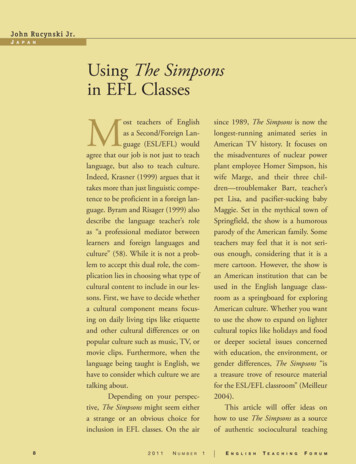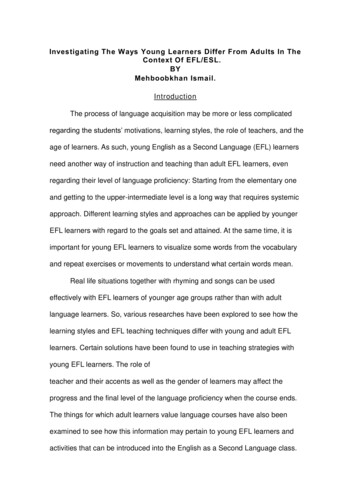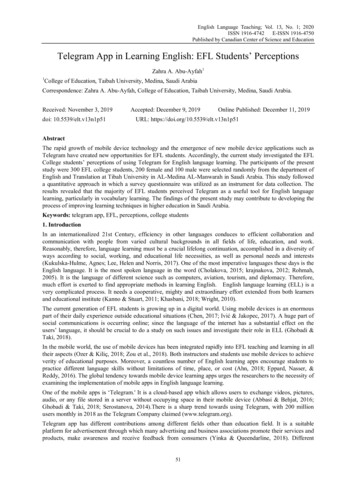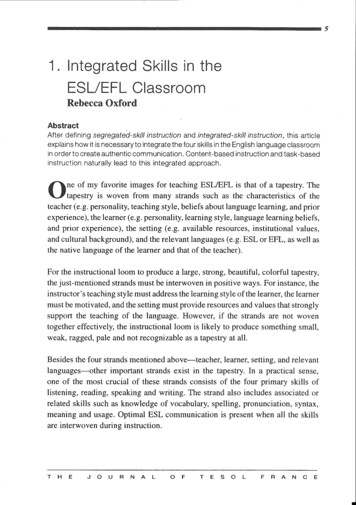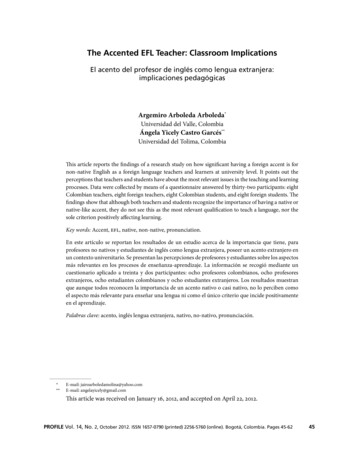
Transcription
The Accented EFL Teacher: Classroom ImplicationsEl acento del profesor de inglés como lengua extranjera:implicaciones pedagógicasArgemiro Arboleda Arboleda*Universidad del Valle, ColombiaÁngela Yicely Castro Garcés**Universidad del Tolima, ColombiaThis article reports the findings of a research study on how significant having a foreign accent is fornon-native English as a foreign language teachers and learners at university level. It points out theperceptions that teachers and students have about the most relevant issues in the teaching and learningprocesses. Data were collected by means of a questionnaire answered by thirty-two participants: eightColombian teachers, eight foreign teachers, eight Colombian students, and eight foreign students. Thefindings show that although both teachers and students recognize the importance of having a native ornative-like accent, they do not see this as the most relevant qualification to teach a language, nor thesole criterion positively affecting learning.Key words: Accent, EFL, native, non-native, pronunciation.En este artículo se reportan los resultados de un estudio acerca de la importancia que tiene, paraprofesores no nativos y estudiantes de inglés como lengua extranjera, poseer un acento extranjero enun contexto universitario. Se presentan las percepciones de profesores y estudiantes sobre los aspectosmás relevantes en los procesos de enseñanza-aprendizaje. La información se recogió mediante uncuestionario aplicado a treinta y dos participantes: ocho profesores colombianos, ocho profesoresextranjeros, ocho estudiantes colombianos y ocho estudiantes extranjeros. Los resultados muestranque aunque todos reconocen la importancia de un acento nativo o casi nativo, no lo perciben comoel aspecto más relevante para enseñar una lengua ni como el único criterio que incide positivamenteen el aprendizaje.Palabras clave: acento, inglés lengua extranjera, nativo, no-nativo, pronunciación.***E-mail: jairoarboledamolina@yahoo.comE-mail: angelayicely@gmail.comThis article was received on January 16, 2012, and accepted on April 22, 2012.PROFILE Vol. 14, No. 2, October 2012. ISSN 1657-0790 (printed) 2256-5760 (online). Bogotá, Colombia. Pages 45-6245
Arboleda Arboleda & Castro GarcésIntroductionMuch concern has been raised about the abilityof non-native English teachers to serve the interestsof English as a foreign language (EFL) or Englishas a second language (ESL) students; namely, tobecome proficient in a language that is not theirown. Specifically, doubt has been cast as to whetheran English teacher whose language is characterizedby flaws in pronunciation, intonation, and grammar patterns, among others, is still in a position toeffectively meet his students’ needs for successfulcommunication. In other words, can a non-nativeEnglish speaker, an accented English teacher, bea good language model for her/his students? Thisarticle seeks to discuss the role of non-nativeEnglish teachers in their students’ language learningprocess. To do this, the authors have inquiredinto research findings in the multilingualism,the EFL, and the ESL areas. They have also drawnfrom native and non-native EFL and ESL classroomteachers’ and students’ perceptions, as well as fromthose held by native speakers of English outside theEFL/ESL teaching profession.Review of LiteratureThe Bilingualism IssueMuch of the discussion dealing with the nonnative English teacher, irrespective of whether heis in an EFL or an ESL context, focuses on whetherhe is bilingual. Generally speaking, bilingualism, asa sociolinguistic phenomenon, is the co-existenceor use of two languages for communicative purposes. Easy to understand, right? A problem arises,however, when an attempt to define the term bilingual is made, for there is no such thing as a soledefinition of it. To make it worse, a definition ofbilingual is usually made or chosen on subjectivegrounds, in spite of counter-evidence. For example,the Oxford Advanced Learner’s Dictionary (2000)46defines bilingual as being “able to speak two languages equally well because you have used themsince you were very young” (p. 109).Now, let us see what is implied in this definition. First, knowing a language is being reducedto only the oral production domain, when in fact,we all know that there is much more to it, namely,reading, listening, and writing. Second, the notionequally well casts some doubt, since except forthose who have grown up using two languages, it isvirtually impossible to attain a balanced linguisticproficiency. Thus, a claim can be made that in thecase of a foreign language speaker, no matter howwell he uses the language, he feels better performing in his mother tongue. Third, since you werevery young leaves aside the greatest number ofpeople who have learned a new language either intheir late youth or adulthood. The question is, then:Under a definition of bilingualism, like the one provided by the Oxford Advanced Learner’s Dictionary(2000), is someone who has learned English as aforeign language a bilingual person? Clearly not.If so, can someone who does not fit this definition,and so is not bilingual, be an ESL/EFL teacher? Again,no. Canagarajah (1999) argues that rather than amatter of linguistic abilities, it is a social, political,and even racial matter that is at stake when considering the abilities and role of non-native EFL/ESLteachers. In his view, this is so serious an issue thatit has come to undermine people’s otherwise positive perceptions of these professionals.Commonly-Accepted Classifications of Bilingual PeopleBased on empirical studies, researchers havecome to classifying bilingual people in the light of twomain criteria: age and linguistic skills or proficiency.The Age FactorThe Critical Period Hypothesis, advanced byLenneberg (1967), which was initially connected toUniversidad Nacional de Colombia, Facultad de Ciencias Humanas, Departamento de Lenguas Extranjeras
The Accented EFL Teacher: Classroom ImplicationsEquilingual: He who, in any situation in bothlanguages, passes for a native speaker i.e. he isindistinguishable from a native speaker. This isthe strictest feeling of bilingualism advocatedby some language planners and, unfortunately,by some language scientists.These four categories are usually linked to whatlanguage skills the bilingual individual exhibits inhis use of the L2:first language research, claims that there is a biological period when language can be more easilyacquired. Lenneberg (1967) and Bickerton (1981)make strong statements in favor of a critical periodbefore which and after which certain abilities do notdevelop. In this same line of thought, researcherssuch as Singleton and Ryan (2004), among others,argue that a critical stage for second languageacquisition occurs around puberty. This has ledsome to assume, incorrectly, that by the age of 12or 13 you are “over the hill” when it comes to thepossibility of successful second language learning(Brown, 1993. p. 52-53).Klein (2002) suggests a well-thought classification of bilingual people and states that: In accordance with the age factor, individuals are classified as to have in the second language. Thus, a passive bilingual is onewho can only cope with this skill in the second language, whereasin his first language he is normally proficient in the four skills. Speaking: This is the ability you generally expect a dominant,a balanced, as well as an equilingual to have.Early Bilinguals. These are the ones who have acquired theirsecond language while being very young. They are subdividedListening: This is the minimal competence a bilingual is expectedReading: This is the threshold where a dominant bilingual oftendrops out for his second language, but not inevitably. Writing: It is well known that writing is a difficult skill forinto (a) simultaneous bilinguals, that is, they acquired their twopeople to master, even in their native language for it calls forlanguages at the same time; and (b) sequential bilinguals, thoserefined knowledge of grammar, syntax, vocabulary, and mechan-whose second language was acquired after their first language.ical aspects of the language, among others. Hence, an equilingualA second class is made up of Late Bilinguals or those whoand a balanced bilingual are expected to be proficient in L2have acquired their second language at an age other than theirwriting. (Information retrieved from http://www.bklein.info/childhood. (p. 1)buc categorize.html)He expands this concept with a more detailedclassification, warning that there are no clearlydefined levels of bilingual skills but rather alanguage continuum, according to which the following classification is set up. Passive bilingual: A person who is a nativespeaker of one language and is capable of understanding but not of speaking the other language. Dominant bilingual: A person who is more proficient in one of the two languages, showing nativelike proficiency in his second language (L2). Balanced bilingual: Someone who is more orless equally proficient in both languages, butwill not necessarily pass for a native speaker inboth languages.The preceding discussion calls for exertingcaution so as to not consider this bilingual classification approach complete. This incompleteness isapparent because just as in the case of any otherabstraction, it leaves aside important considerations. For example, it does not take into accountthe existence of real people who are highly proficient in reading comprehension and in writing butare poor in understanding oral language and inspeaking the second language. Likewise, cases havebeen reported which show that language learnershave overridden the neurobiological critical periodeffects in their pursuit to achieve native-like language proficiency, as Canagarajah (1999) points outwhen referring to his own case.PROFILE Vol. 14, No. 2, October 2012. ISSN 1657-0790 (printed) 2256-5760 (online). Bogotá, Colombia. Pages 45-6247
Arboleda Arboleda & Castro GarcésThe Correct Pronunciation IssueThe concept correct pronunciation is an elusiveone. As early as 1959, the Webster’s New CollegiateDictionary introduces its Pronunciation Guidepointing out thatThe standard of English pronunciation, so far as a standard maybe said to exist, is the usage that now prevails among the educatedand cultured people to whom the language is vernacular; but sincesomewhat different pronunciations are used by the cultivated indifferent regions too large to be ignored, we must frankly admitthe fact that, at present, uniformity of pronunciation is not to befound throughout the English-speaking world. (p. ix)For some seemingly hidden reasons however,a great number of people at the decision-makingechelon insist on pushing the idea of a uniform,unique concept of English pronunciation. Fortunately for many, since such a stance is based onsubjective, interest-group serving grounds, it canbe easily challenged.Although important, pronunciation of a language is by no means the sole criterion for languageproficiency, nor is it really the most important one.Thus, there are cases of people who have less thanperfect pronunciation of a second language, butthey are still highly proficient in other areas of it.Brown (2007) believes that a modern version of thisphenomenon might be called the Arnold Schwarzenegger Effect. Who would doubt that California’sGovernor is proficient in the English language, justas is any other American? In the end, if a correctpronunciation is a discrete, mental elaboration,shouldn’t we speak of comprehensible pronunciation instead?The Issue of the Accented ESL /EFL TeacherThe credited Webster’s New Collegiate Dictionary defines accent as “the prominence given toa syllable or a word which makes it stand out to theattention above adjacent syllables or words” (1959,48p. vii). Within the context of this article however,we refer to accent as the quality of a person’s speechthat, in the view of language authorities, sets thisperson apart, as not belonging to mainstream, ornot fitting the (idealized) norm. It is within thiscontext that we speak of the accented teacher, particularly the ESL/EFL teacher.Partially borrowing from Kachru (1986) andfrom political economy terminology, Canagarajah (1999) introduces the notions Center speakersof English and Periphery speakers of English anduses these two terms to refer to a native Englishspeaking teacher and a non-native English-speakingteacher, respectively. She points out that those inthe first group are the ones whose first languageis the vernacular English of Britain, the UnitedStates, Australia, and New Zealand. In the secondgroup are those on the periphery, that is, outsidethese four countries, even if they speak English asa native language or a second language, as in Canada, Ghana, Sierra Leona, for example. These areso-called accented teachers, the ones whose speechis deemed foreign. This distinction may lead toan interesting question: Is this simply a matter ofindividual linguistic abilities, or is there more thanthat? That is, is this a sociolinguistic phenomenon,realized within political and economic conditions? Let us consider some recent developmentsconcerning school districts in Arizona, which hassparked a hot debate between some educationofficials and practicing teachers, and which mayhelp shed some light on the discussion involvingaccented English teachers.In an article published in the influential WallStreet Journal, Jordan (2010) reports a surprisingmove made by the Arizona Department of Education, namely that “teachers whose spoken Englishit deems to be heavily accented or ungrammatical must be removed from classes for students stilllearning English” (p. 1). According to this author,Universidad Nacional de Colombia, Facultad de Ciencias Humanas, Departamento de Lenguas Extranjeras
The Accented EFL Teacher: Classroom Implicationsthe motivation of the education authorities is toguarantee that low-proficiency level students aretaught by native-like English proficiency teachers.She also says that in order to pave the ground forwhat Arizona’s teachers believe will be punitiveactions, the Education Department has scheduledclassroom observations statewide to evaluateteachers’ oral production –with a focus on pronunciation, correct use of grammar, and writing skills.But what are people’s perceptions of accentedEnglish at large, and of accented English teachers,in particular? One of our subjects, an AmericanNative speaker of English, who is referred to hereas Reliever 3, speaks her mind as follows:But in the realm of the ESL/EFL profession,what could be the effects of having an accent, particularly when the teacher is not a Center speakerof English? Frustrated Italian, another participant in this study, aired her feelings in a rathermoving way:No offense meant, but why would you want to? I guess, as anlanguage. I also speak French, Spanish, and studied German inAmerican I find the variation of accents to be beautiful. I willschool. I’m not saying that nobody would hire me, but all theadmit that Americans don’t all have the same accent either, sojobs I was interested in, said on the application: DO NOT APPLYwhich one do you want? After all do you like a Texas drawl, theIF YOU ARE NOT A NATIVE SPEAKER. Fair enough, but all I’mclipped speech of a New Yorker, the California slang, Southwesternsaying is, I’m young, energetic and I love teaching, and if I liedSpanglish, or a Midwestern slur? I have always lived in the US andabout my nationality they wouldn’t even notice it. All I can do isnever traveled farther than just over the Canadian border; yet,to rely on that one job out of ten, which gives a chance to non-everywhere I go, I am told I have an accent. Funny thing is thatnative speakers too.I’m Italian, and I have been living in London for seven years,where I graduated in Fine Arts from an American University.After that, I moved to Thailand to take my TEFL certificate andmy grades turned out to be higher than the rest of the class(ALL NATIVE SPEAKERS). This is due to my wide knowledgeof both Italian and English grammar, and also to the fact that Ihad already learned English as a foreign language. Therefore, Iknow the process one has to go through to actually learn a newmost of my life has been spent in the same area and even there Ifamily had lived in the US for 30 years and her Japanese accentThis person’s experience is not much differentfrom that of an Austrian who was thankful to bean informant:was so strong many people had a hard time understanding her.I lived in Australia for 42 years, had a business there, got aA friend of mine in college was from Romania and her accentuniversity degree, did a TESOL course, studied English, etc. Iafter 15 years was still pretty strong also. She spoke in Romanianhad no problems teaching Buddhist nuns in Tibet, but whento her family and explained to me that it wasn’t the accent that wasI applied for a job, teaching English in Graz (Austria), recently, Iimportant but the fact that she learned English.was knocked back because I was born in –wait for it. AUSTRIA!have an accent. I wouldn’t worry as much about accent as I wouldjust learn the language. I will also admit that a good friend of myI am so frustrated, I could scream!” (Frustrated 2)Reliever 3 seems to confirm what is now commonplace: accents exist; they are a reality, a realitypeople should live with. Also interesting is the factthat even Center Speakers of English, like Reliever 3,admit to having been made aware of how differenttheir speech sounds. Fortunately for society at large,it is usage that makes a language, not prescription.These testimonies give rise to an importantquestion: Why is it that after being licensed by anaccredited institution a graduate is told that he cannot be hired because his qualifications do not meetcurrent standards?Luckily for this Italian, this Austrian, and manyothers in their situation, timely research is contrib-PROFILE Vol. 14, No. 2, October 2012. ISSN 1657-0790 (printed) 2256-5760 (online). Bogotá, Colombia. Pages 45-6249
Arboleda Arboleda & Castro Garcésuting to disclaim the superiority of a certain kindof English or certain accent over the others. Oneof these enlightening endeavors is Leikin, Ibrahim,Eviatar, and Sapir’s (2009). They conducted a studyin Israel with sixty participants from different language backgrounds who were exposed to Hebrewphrases recorded in different foreign languageaccents. The researchers found that it was easierfor the Hebrew speakers to recognize the material,independently of the accent it was spoken in, than itwas for the other subjects. Based on their findings,Leikin and his colleagues concluded that secondlanguage acquisition is facilitated by having learnersinteract with a teacher who shares their own accent,who speaks their first language, and who is readyto assist them in learning more about their newlanguage. The research team’s findings are corroborated by the present study which found that,sometimes, L2 students favor non-native teachersbecause, in their opinion, these teachers are in abetter position to help them in their error correction process, as they know their students’ languageneeds, a crucial factor in establishing teacherstudent rapport.Research QuestionsThis study seeks to answer two questions:1) How significant is it for non-native EFL teachersand learners at university level to have a foreignaccent? 2) What perceptions do EFL teachers andstudents have about the most relevant issues in theteaching and learning processes?AimsThe aim of the study is to shed light on the roleof the accent in foreign language teaching and itsinfluence on foreign language learning so that decisions can be made and implemented to better servestudents’ needs while helping teachers improvetheir language skills.50MethodSubjects of the StudyThe study was carried out in an academic context with subjects involved in EFL teaching andlearning. The sample was made up of 32 participants, classified into two groups: 16 EFL teacherswith different teaching experiences and nationalities (eight Colombian university teachers andeight foreign university teachers, in differentcountries) and 16 EFL students from beginningto advanced level and different nationalities (eightColombian college students, in Colombia, and eightforeign college students, in different countries). Thisnumber of participants allowed us to gather datawith which to analyze the perceptions that teachersand students have of teachers whose first languageis not English, more specifically of teachers who arebelieved to be accented, and the preferences thatstudents have regarding teachers’ accents when itcomes to taking English classes and how these perceptions might influence EFL learning.For the Colombian context, eight foreignteachers who have lived and worked in other partsof the world were considered in order to look atany differences that may be found in other places.The eight Colombian teachers in the study haveall worked at university level and taught different levels of English, so their teaching experienceand perceptions may be similar. Nonetheless, theyhave lived diverse experiences while teaching inColombia or while living abroad, which may havehelped change their perceptions.The sixteen EFL students in the study have haddifferent classroom experiences. Comparing theexperiences of foreign and Colombian studentshelped us analyze how the language teaching andlearning processes and the student perceptions inColombia may be different from those in otherparts of the world.Universidad Nacional de Colombia, Facultad de Ciencias Humanas, Departamento de Lenguas Extranjeras
The Accented EFL Teacher: Classroom ImplicationsData Collection ToolsA semi-structured five-scale questionnaire wasdesigned in order to get a good grasp of the perceptions that EFL students have of non-native oraccented EFL teachers and constraints that theseteachers experience because of their foreign accent.ResultsThe different perceptions that EFL students mayhave of non-native EFL teachers and the constraintsthat EFL teachers experience because of theirforeign accent motivated this study.Following is a series of tables and figuresthat present the different variables and the number of tokens that occurred during the datacollection stage. The analysis compares perceptions and preferences among participants, basedon students’ educational levels and teachers’experiences.Group 1: The EFL TeachersTable 1 shows the demographic information forthe sixteen teachers who participated in the study.Table 1. Teachers’ Demographic InformationCodeOriginEFL levels taughtYearsof experienceEducationallevelT1FKoreaBeginners to Advanced10MAT2FKoreaBeginners to Intermediate20PhDT3FChinaBeginners to Intermediate3MAT4FChinaBeginners4MAT5FSaudi ArabiaBeginners to Advanced8MAT6FVenezuelaBeginners to nners to Advanced10MAT1CColombiaBeginners to Advanced5BAT2CColombiaBeginners to Advanced20BAT3CColombiaBeginners to Intermediate12MAT4CColombiaBeginners to Intermediate8BAT5CColombiaBeginners to Advanced20BAT6CColombiaBeginners to Advanced16BAT7CColombiaBeginners to Intermediate10MAT8CColombiaBeginners to Intermediate5BANote: the coding in the far left column stands for the following variables among participants: T teacher,1 2 3 4 5 6 7 8 number assigned randomly, F foreign, C Colombian.PROFILE Vol. 14, No. 2, October 2012. ISSN 1657-0790 (printed) 2256-5760 (online). Bogotá, Colombia. Pages 45-6251
Arboleda Arboleda & Castro GarcésIn group 1, each of the sixteen teachers answered5 questions (see Appendix A). Although teacherscould choose an option and answer the questionsas close-ended ones, they could also expand theiranswers and give reasons to justify their choice.The answer to each question drew the following results:Figures 1A and 1B. Question 1: Whatkind of teachers did you have whenyou were learning English?Native speakers, non-native speakers or both?Figure 1A. Kind of Teachers Foreign Teachers Had7654a- Native3b- Non-nativec- Both210abcNº. answersFigure 1B. Kind of Teachers ColombianTeachers HadAs shown in figure 1A, six out of eight foreignteachers had both native and non-native teacherswhile learning English. The other two (T2F andT6F) had non-native English teachers only. Meanwhile, figure 1B shows that six Colombian teacherswere taught by native and non-native teachers. Theother two (T5L and T6L) had native English teachersonly. One essential aspect to analyze in these datais whether having native, non-native or both kindsof teachers changed their perceptions of what kindof teachers were better for them when learning alanguage.Figures 2A and 2B clearly present teachers’preferences as learners. When analyzing foreignteachers’ preferences, it is noted that at least one ofthem (T8F) preferred native teachers, although hementioned that both native and non-native teachersdid a great job. Besides, T2F and T6F, who onlyhad non-native teachers, coincided in saying thatthey preferred both native and non-native teachersfor similar reasons, such as being able to contrastbetween teachers who know what their students’needs are because they also know the students’native language and teachers whose pronunciationis a very good model to follow. Meanwhile, T5Land T6L, who only had native speakers as teachers,admitted to having no preference as long as theirteachers knew the language very well.Figures 2A and 2B. Question 2: Did you have anypreferences for native or non-native speakers?Please explain.7654a- Native3b- Non-nativec- Both2Figure 2A. Foreign Teachers’ Preferences4,54,03,5a- Native3,010c- No preferenced- Both2,0abNº. answersc1,51,00,50,052b- Non-native2,5aNº. answersbcdUniversidad Nacional de Colombia, Facultad de Ciencias Humanas, Departamento de Lenguas Extranjeras
The Accented EFL Teacher: Classroom ImplicationsFigure 2B. Colombian Teachers’ Preferences4,54,03,5a- Native3,0b- Non-native2,5c- No preferenced- Both2,01,51,00,50,0aNº. answersbcdOn the other hand, 50% of the foreign teacherspreferred both native and non-native teachers forreasons such as finding a bigger challenge in nativespeakers and having better rapport with non-nativespeakers.Fifty percent of the Colombian teachers alsomentioned that both native and non-native teachersare good and so none of them preferred nativespeakers only. There was the case of T1L whobelieved that non-native speakers were betterbecause they could help Spanish speakers understand English better.Teachers from the two groups expressed similar opinions about the characteristics a teachershould have. Tables 2A and 2B show what theseEnglish teachers think is the most importantwhen they enter a classroom and deal with students. Having a good command of the languageis, in fact, important. Nevertheless, it is not theonly essential characteristic a teacher shouldexhibit. There are some other relevant issues thatmatter for them such as patience, creativity, tolerance of diversity, and awareness of students’needs, among others.Tables 2A and 2B. Question 3: As an English teacher, what are the most importantcharacteristics a teacher should have?Table 2A. EFL Teacher’s Characteristics IParticipantForeign TeachersT1FPatience, easygoingness.T2FLanguage knowledge.T3FTeaching based on students’ learning needs.T4FKnowledge of students’ L1 and needs for learning the language.T5FAbility to motivate students.T6FPatience and love for what you do.T7FFlexibility, patience and tolerance of diversity.T8FFluency in the target language and good teaching skills.PROFILE Vol. 14, No. 2, October 2012. ISSN 1657-0790 (printed) 2256-5760 (online). Bogotá, Colombia. Pages 45-6253
Arboleda Arboleda & Castro GarcésTable 2B. EFL Teacher’s Characteristics IParticipantLocal TeachersT1LLove for teaching and patience.T2LCreativity, fluency and dedication.T3LPatience and dedication.T4LPatience and knowledge.T5LGood knowledge of the language and patience.T6LGood human being.T7LCreativity, flexibility and a good teaching philosophy.T8LPatience, love for teaching and knowledge of the target language.Figures 3A and 3B. Question 4: Is havinga foreign accent relevant for you as an Englishteacher? Why?Figure 3A. Accent Relevance for Foreign Teachers654a- Yes3b- No21b0aNº. answersbFigure 3B. Accent Relevance for Colombian Teachers86a- Yes4b- No20a54Nº. answersbFigures 3A and 3B indicate that twelve out ofsixteen teachers stated that having a foreign accentis not relevant for them. When it came to justifying their answers, teachers mentioned reasonssuch as “The ultimate goal when learning a language is communication, not accent”, “TeachingEnglish is not only a matter of pronunciation”,and “A teacher’s accent does not affect students’learning process.” However, a few teachers are stillconcerned about having a foreign accent themselves because, from their point of view, it affectsstudents’ language learning process or becausestudents can question the teacher’s ability to speakthe language if he does not have at least a nativelike accent.Tables 3A and 3B include a summary of theexperiences the participating teachers recalled inconnection to their foreign accent.Some of the negative accent-related experiences such as those of T1F, T2F, T3F, T7F and T4Ldo not seem to be due to their foreign accent but topronunciation concerns. In all cases, these teachersUniversidad Nacional de Colombia, Facultad de Ciencias Humanas, Departamento de Lenguas Extranjeras
The Accented EFL Teacher: Classroom ImplicationsTables 3A and 3B. Question 5: Recall any good or bad experiences you may have had because of yourforeign accent. Include experiences as a teacher or any other experiences outside the classroom–in your country or in an English-speaking country.Table 3A. EFL Accent-Related ExperiencesParticipantForeign teachersT1FThe reaction “What!” What did you say? makes me feel bad.T2FAt the beginning, many Americans said “Pardon”? or What
tionary defines accent as “the prominence given to a syllable or a word which makes it stand out to the attention above adjacent syllables or words” (1959, p. vii). Within the context of this article however, we refer to accent as the quality of a person’s sp
